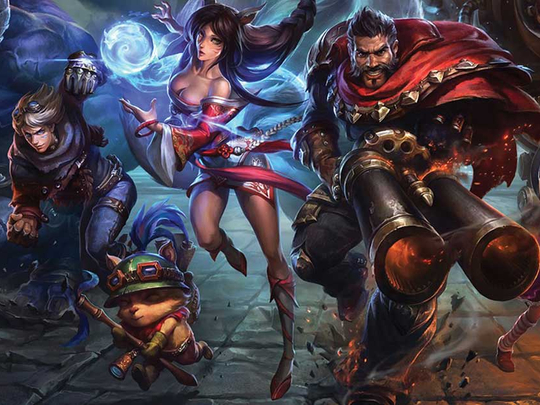
“Mid or feed”: Words that cause collective facepalms to echo through the cybersphere multiple times a day, as they signify that the next hour or so of your gaming time is going to be an exercise in frustration.
It’s a phrase often uttered in so-called MOBAs (Multiplayer Online Battle Arena games), an extremely popular genre of online games. The two main examples of this genre are Dota 2 and League of Legends, with the former boasting around eight million monthly players, and the latter 100 million.
It’s a genre infamously difficult to describe, but it goes something like this: two teams of five heroes battle it out to destroy the other side’s base, located at opposite ends of the map. Neutral, AI-controlled “creeps” help, moving along three lanes situated in the middle, left (called top) and right (called bottom) of said map. This is also where most of the hero-based gameplay takes place. The so-called mid lane is best reserved for specific types of heroes, and for players with the necessary skill-set to make the best possible use of it and in so doing help their team along to victory. Losing against the other side’s mid-lane hero often means losing the game.
So when someone calls out “mid or feed” at the start of a game, they’re indicating they have no intention of being a team player. They’re demanding to take the mid lane, where they can show off their probably non-existent skills. And if the other players won’t let them, they’ll “feed” in response, meaning die on purpose to the other side so as to make their heroes more powerful and ultimately ensure a victory for the opposing team.
Unfortunately, this particular type of jerk is only one of many you’re likely to encounter in Dota 2, League of Legends, or practically any other of the myriad online multiplayer games out there.
Yes, there are those who will throw the game on purpose if they don’t get their way, but there are also the cheaters and the verbally abusive (racist, sexist — pick a form of bigotry, and it will be represented).
Website comments sections and social media has made it abundantly clear to everyone by now that the semi-anonymity and physical distance from the targets of their invective make people behave far worse online than they ever would in real life. Would you swear at and threaten the life of someone who presses the wrong button in the lift you just got into?
But mix the lack of any fear of consequences with the competitive nature of most online gaming encounters, and you have the perfect storm.
I don’t think all of this says anything about gamers in general. Bad manners are sadly a universal constant on the internet, as already mentioned.
Ultimately, the bad behaviour of some isn’t enough to turn most people away from enjoying their favourite online games.
One reason is that even those who deplore this sort of behaviour have probably been guilty of it themselves at one point, saying something not-so-nice in the heat of the moment of a particularly tough encounter, no different from what might happen on the football field or a cricket pitch. Is it nice? No. Completely avoidable? Not completely.
Fortunately, game developers have come a long way in dealing with this problem, putting in place systems that allow abusive players to be reported and to be removed from the general gaming population until they change their ways.
So what should you do the next time you see “mid or feed” pop up on the chat screen? Just take a big breath and feel fortunate that in less than an hour your ordeal will be over. The same can’t be said by those the gamer shares his physical life with…







